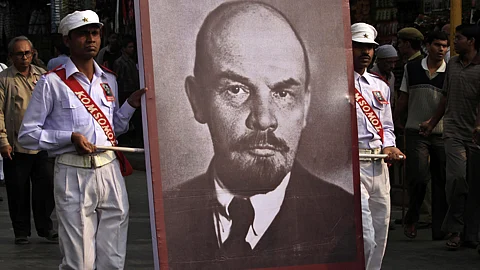
- HOMEGROWN WORLD
- #HGCREATORS
- #HGEXPLORE
- #HGVOICES
- #HGSHOP
- CAREERS
- ABOUT US
- CONTACT US

In the long list of foreign names etched into India’s anti-colonial history, Vladimir Lenin stands tall as a central node in the evolution of Indian revolutionary thought. His influence spanned continents, ideologies, and decades. From the pages of underground manifestos in Bengal to the echoes of “Inquilab Zindabad” in colonial prisons, Lenin’s ideas seeped into India’s bloodstream, forming an intellectual and tactical backbone to many who sought liberation from British rule.
Indian revolutionaries admired Lenin not only for his theory but for his clarity of action. In 1920, a message of solidarity arrived in Soviet Russia from Indian revolutionaries in exile, hailing the Bolshevik Revolution as a model for all colonised nations. Lenin replied in kind, calling the Indian people’s resistance “a heroic fight for freedom.” He understood colonialism as capitalism’s natural extension — its most brutal, most exploitative arm. For Lenin, the defeat of British rule in India was a necessity for the defeat of capitalism.
Lenin and the Communist International (Comintern) provided direct support — material, strategic, ideological — to Indian revolutionaries. In 1920, it was Lenin who received M.N. Roy in Moscow and helped formulate the early principles of the Communist Party of India (CPI). Roy, guided by Lenin, wrote some of the CPI’s foundational texts and published works that laid the groundwork for a new, militant political consciousness in India. The CPI’s formal birth in Tashkent in 1920 was, in essence, Lenin’s answer to colonial subjugation.
Lenin’s influence in India filtered into the strategies and ideals of revolutionaries operating underground in Bengal, Punjab, and the United Provinces. Bhagat Singh, Chandrashekhar Azad, and their comrades in the Hindustan Socialist Republican Association (HSRA) read Lenin. They studied his method, admired his rigour, and adapted his critique of imperialism to Indian conditions. In fact, just before his hanging in 1931, Bhagat Singh was reading Lenin and reportedly said to his jailer, “Wait a while. A revolutionary is talking to another.”
Lenin’s ideas gave Indian revolutionaries a new grammar. Terms like “class struggle,” “imperialism,” and “vanguard” entered the political lexicon through prison manifestos and street pamphlets. These were tools for real confrontation with the colonial state.
Mainstream leaders, too, were not immune to the pull of Lenin’s ideas. Gandhi, though critical of Bolshevik violence, acknowledged the sacrifice behind the revolution. He called the October Revolution “a historic event that cannot be in vain.” Nehru, more enthusiastic, was deeply inspired by his 1927 visit to the Soviet Union. He praised the Bolshevik project in The Discovery of India, calling it “a flame that cannot be extinguished.”
Even B.R. Ambedkar — no friend of Marxism — saw potential in the Soviet model. His proposals for state socialism borrowed elements from Soviet planning while adapting them to a parliamentary framework. He saw Marx as “a residue of fire, small but very important.”
The reach of Leninism extended beyond party politics. Writers like Sumitranandan Pant, Dinkar, and Premchand found in Lenin a symbol of human dignity and radical change. The Indian state itself once acknowledged this legacy. In 1970, on the centenary of Lenin’s birth, India issued a postage stamp in his honour, organised cultural festivals, and hosted public lectures on his contribution to India’s political evolution.
This recognition, however, has eroded. In 2018, when Lenin’s statue in Tripura was toppled by Hindutva supporters after a BJP victory, it was erasure. It isn’t necessary to canonise Lenin or accept every act of the Bolsheviks. But to ignore Lenin’s role in shaping India’s freedom struggle, to write him off as an irrelevant foreigner, is a deliberate act of amnesia. If statues of Lenin fall, that doesn’t mean his ideas crumble.
As the poet Langston Hughes wrote in his poem 'Lenin':
Lenin walks around the world.
Black, brown, and white receive him.
Language is no barrier.
The strangest tongues believe him.
